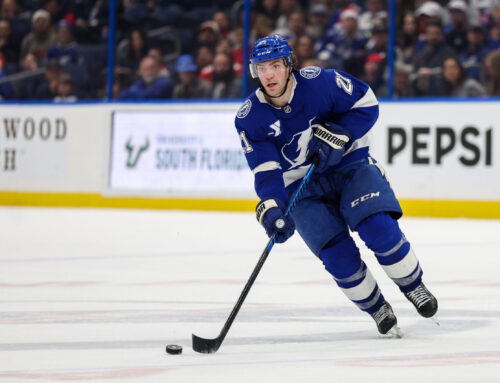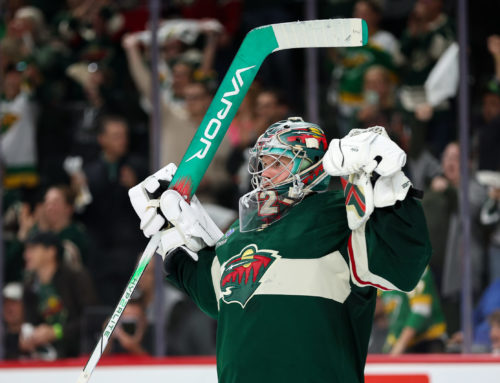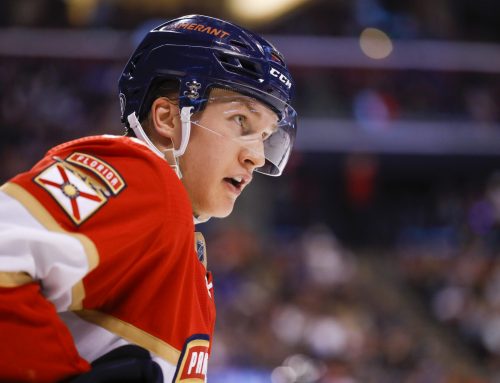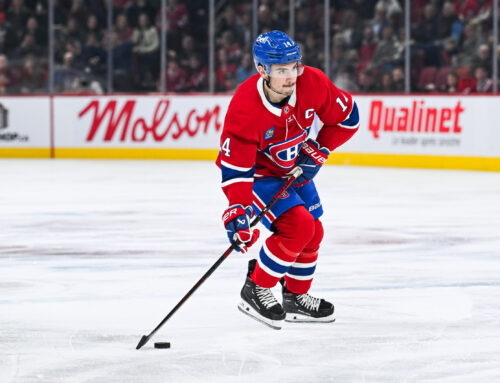
Cam Atkinson
It’s crucial to be able to discern when a player has truly arrived as a fantasy force versus just being on a sustained hot streak. With that in mind, this week’s battle pits Cam Atkinson, who had hot stretches in 2016-17 and last season, plus has started strong for 2018-19, against Mike Hoffman, whose consecutive points streak came to an end a little over a week ago at 17 games. Can either do what they’ve yet to accomplish so far, namely sustain top production for an entire season? And which one projects to be better over the next several seasons? Cage Match is on the case and starts now!
Career Path and Contract Status
Atkinson, 29, was selected 157th overall in 2008 and played three years of college hockey, the last two totalling 105 points (61 goals) in 80 games, then for 2011-12 and 2012-13 spent time in the minors (82 points in 84 games) and NHL (32 points in 62). With nothing left to prove in the AHL, Atkinson was with Columbus to stay for 2013-14 and produced identical 40 point outputs in his first two seasons before hitting his stride with 53 points in 2015-16 and 62 in 2016-17. Last season’s 46 points in 65 games look unremarkable, but he ended the season with 33 points in 33 games. That, plus his 42 points in 40 games to start 2016-17, shows that Atkinson seemingly has the tools to put together an elite campaign, yet somehow hasn’t been able to do so although this season he’s once again above a point per game scoring so far.
Hoffman, 28, was also a draft bargain (130th overall selection in 2009) who took a while to become an NHL regular, playing two more years of junior hockey then 242 AHL games before finally sticking with the Sens for 2014-15. Unlike Atkinson, however, Hoffman paid quicker dividends, first tallying 49 points, then 59 in 2015-16 and 61 in 2016-17, with 26-29 goals in each season. But 2018-19 saw Hoffman’s output drop to 56 points (only 22 goals) and him mired in an off-ice saga that essentially forced the team to trade him this offseason, landing him in Florida where he’s shined, including the aforementioned 17 game points scoring streak.
Atkinson is on year one of a seven-season deal inked in November 2017 and counting $5.87M per season against the cap, while Hoffman is signed through 2019-20 on a deal that dings the cap at $5.18M per campaign.
Ice Time (data in this and the other tables is current through December 3rd)
|
Season |
Total Ice Time per game (rank among team’s forwards) |
PP Ice Time per game (rank among team’s forwards) |
SH Ice Time per game (rank among team’s forwards) |
|
2018-19 |
18:54 (C.A.) – 2nd 17:37 (M.H.) – 4th |
2:56 (C.A.) – 2nd 3:15 (M.H.) – 5th |
1:18 (C.A.) – 3rd 0:01 (M.H.) – 10th (tied) |
|
2017-18 |
18:54 (C.A.) – 2nd 18:24 (M.H.) – 4th |
2:45 (C.A.) – 2nd 3:06 (M.H.) – 2nd (tied) |
1:25 (C.A.) – 4th 0:03 (M.H.) – 12th |
|
2016-17 |
18:05 (C.A.) – 3rd 17:36 (M.H.) – 3rd |
2:32 (C.A.) – 3rd 3:11 (M.H.) – 1st |
1:33 (C.A.) – 4th 0:01 (M.H.) – 13th (tied) |
|
2015-16 |
17:48 (C.A.) – 2nd 17:33 (M.H.) – 4th |
2:15 (C.A.) – 3rd 2:27 (M.H.) – 6th |
1:53 (C.A.) – 4th 0:02 (M.H.) – 13th (tied) |
Atkinson’s ice time trends are what one wants to see for a player whose point total has increased, with gains in PP Time and lower SH Time with each passing season. The question is the extent to which Atkinson has depended on Artemi Panarin to achieve his longest stretch of continued success, at nearly 60 games going back to last season. One thing to keep in mind is Atkinson produced at a better than a point per game for the first half of 2016-17, prior to Panarin arriving in Columbus. So it’s not the same as someone who’d never achieved even temporary fantasy success before lining up alongside a star player. Looking at data, last season Atkinson was on the ice with Panarin when 33 of his 46 points were scored, and this season its 17 of 27 points. So although Atkinson’s percentage of points scored while on the ice with Panarin was almost identical to the percentage of time on the ice with Panarin last season (71% vs. 73% respectively) this season there’s more of a gap (63% vs. 73%), so perhaps Atkinson is not as reliant upon Panarin as it might seem, representing is a small silver lining if – as expected – Panarin leaves town.
As for Hoffman, although his ice time is down slightly from past seasons, his PP time is up; and given the long-term injury to Vincent Trocheck it’s unlikely to drop. Yet the differences are nominal – seemingly not enough to morph a player who’d scored at 61, 67, and 56 points full-season paces over his last three seasons into a point per game scorer. Digging deeper, the average goals scored by Ottawa over the past three seasons was 218. As of now, Florida is on pace for 265 goals for 2018-19, which would represent a roughly 20% increase over what Hoffman was used to in Ottawa. Moreover, if we look at the 67 point pace at which Hoffman scored in 2016-17 and up it by 20% we get 80 points or roughly a point per game. So perhaps Hoffman isn’t overachieving, but rather being helped by playing for a comparatively more offensively successful team?
Secondary Categories
|
Season |
PIMs (per game) |
Hits (per game) |
Blocked Shots (per game) |
Shots (per game) |
PP Points (per game) |
|
0.48 (C.A.) 0.32 (M.H.) |
0.32 (C.A.) 0.48 (M.H.) |
0.36 (C.A.) 0.20 (M.H.) |
3.80 (C.A.) 3.72 (M.H.) |
0.28 (C.A.) 0.44 (M.H.) |
|
|
2017-18 |
0.21 (C.A.) 0.39(M.H.) |
0.49 (C.A.) 0.38 (M.H.) |
0.44 (C.A.) 0.41 (M.H.) |
3.55 (C.A.) 3.13 (M.H.) |
0.15 (C.A.) 0.25 (M.H.) |
|
2016-17 |
0.27 (C.A.) 0.71 (M.H.) |
0.40 (C.A.) 0.55 (M.H.) |
0.41 (C.A.) 0.29 (M.H.) |
2.92 (C.A.) 3.04 (M.H.) |
0.25 (C.A.)
📢 advertisement:
0.34 (M.H.) |
|
2015-16 |
0.27 (C.A.) 0.23 (M.H.) |
0.58 (C.A.) 0.28 (M.H.) |
0.49 (C.A.) 0.37 (M.H.) |
2.79 (C.A.) 3.10 (M.H.) |
0.12 (C.A.) 0.16 (M.H.) |
Hoffman’s SOG and PPPt rates over the past three seasons were better than I’d have expected for someone whose career best in full-season scoring pace is 67 and produced at a combined 62 point full season pace over his three previous campaigns. In fact, Hoffman’s 59 cumulative PPPts amassed during the past three seasons were equalled or bettered by 33 other forwards, of whom the only other wingers to also average 3+ SOG in each of the past three seasons were Blake Wheeler, Vladimir Tarasenko, Alex Ovechkin, Patrick Kane, and Taylor Hall. What do they all have in common? At least one season with a scoring pace of 77+ points, with four of the five having hit the 90+ point mark at least once.
Also, for Hoffman to have tallied 59 PPPts is especially impressive considering Ottawa was dead last in PPGs over the past three seasons with 122, meaning Hoffman factored into 48% of PPGs scored by his team. That’s important because although his 0.44 PPPts per game rate for 2018-19 looks at first glance to be astronomical, consider that Florida has the league’s third-best PP and has scored a total of 26 goals with the man advantage, meaning that – with 11 PPPts thus far – Hoffman has factored into 42% of his team’s PPGs, for a rate that’s lower than his Ottawa years. Couple that with a significantly higher SOG rate, and Hoffman’s point per game start to 2018-19 is looking far more sustainable than it did when just focusing on ice times.
Turning to Atkinson, this season he’s on pace for career bests in SOG and PPPts rates. But a key stat is his 2016-17 PPPt rate, as although he tallied a not astronomical 21 PPPts that season, 15 came in the 40 games during which he tallied 42 points.
Yet last season Atkinson’s PPPt rate dropped to closer to his “normal” level, such that even with a high SOG rate he couldn’t amass a full season of a point per game scoring. This signifies Atkinson’s Panarin-less hot start to 2016-17 was fueled by what seems to be – for him – an unsustainably high PPPt rate, or at least high without Panarin also in the fold. As such, even if Atkinson’s SOG and PPPt rates both stay high this season and, in turn, lead to him finishing with a point per game or better, if Panarin were to leave, poolies would be rightfully concerned as to whether Atkinson would see his production dip to below point per game levels going forward.
Luck-Based Metrics
|
Season |
Personal Shooting % |
Team Shooting % (5×5) |
Individual Points % (IPP) |
Offensive Zone Starting % (5×5) |
Average Shot Distance |
Secondary Assists % |
|
2018-19 |
16.8% (C.A.) 12.9% (M.H.) |
12.95% (C.A.) 8.08% (M.H.) |
73.0% (C.A.) 60.0% (M.H.) |
66.0% (C.A.) 56.3% (M.H.) |
32.2 (C.A.) 33.8 (M.H.) |
54% (C.A.) 75% (M.H.) |
|
2017-18 |
10.4% (C.A.) 8.6% (M.H.) |
8.79% (C.A.) 8.08% (M.H.) |
57.5% (C.A.) 62.9% (M.H.) |
53.7% (C.A.) 53.2% (M.H.) |
28.2 (C.A.) 37.3 (M.H.) |
27% (C.A.) 47% (M.H.) |
|
2016-17 |
14.6% (C.A.) 11.9% (M.H.) |
7.79% (C.A.) 10.87% (M.H.) |
67.4% (C.A.) 67.4% (M.H.) |
44.8% (C.A.) 55.0% (M.H.) |
28.1 (C.A.) 35.1 (M.H.) |
33% (C.A.) 31% (M.H.) |
|
2015-16 |
11.9% (C.A.) 12.0% (M.H.) |
8.18% (C.A.) 9.57% (M.H.) |
67.9% (C.A.) 74.7% (M.H.) |
46.7% (C.A.) 60.3% (M.H.) |
27.0 (C.A.) 375 (M.H.) |
27% (C.A.) 36% (M.H.) |
It’s important to note that Atkinson played two additional full seasons in addition to those shown here, while Hoffman played only one. For Atkinson, his average team shooting percentage for his previous five seasons was 7.69%, while his IPP averaged to 64.7%. As we can see, he’s blowing away both numbers this season, which is of concern because they’re likely too high to be sustainable given his ample past data. After all, this isn’t a 24-year-old we’re talking about – Atkinson is already 29 years old and thus has likely peaked, meaning it’s difficult to see how these vastly improved metrics aren’t tied to the presence of Panarin. Long story short, this data isn’t encouraging at all; quite the contrary, it’s very disconcerting given his past and Panarin likely being gone by next fall if not earlier.
As for Hoffman, looking also at data from his only other full season (10.58% team shooting percentage, 68.6% IPP, 13.6% personal shooting percentage) we see he’s managing point per game scoring even though he’s well below his previous averages in team shooting percentage (9.7%) and IPP (68.4%). And although it’s encouraging to see that he’s at the point per game level despite being below his norms in these areas, there’s also the reality that his IPP is on track to decrease for the third straight season and for 2018-19 thus far his rate of secondary assists is unsustainable, giving a mixed message takeaway.
Who Wins?
For the narrow winner, I’m going with Hoffman, as although his luck metrics raise some concerns we cannot ignore his PP and SOG rates and the elite company in which that puts him, plus how well he did for what were some pretty awful Ottawa teams. As for Atkinson, although he scored at a point per game rate during the first half of 2016-17 without Panarin, that success looks to have been a byproduct of unsustainable PP scoring, such that if – as all but assured – Panarin leaves Atkinson, who’ll be 30 next season, will see his scoring rate drop. Yet the drop might not be so precipitous in view of only 63% of his points coming with Panarin on the ice with him despite them sharing the ice for 73% of Atkinson’s overall shifts. Even still, I’d be looking to sell high on Atkinson, and soon, since Panarin could be traded before this season is over. With Hoffman, best to hold since his production should stay in his current ballpark and most likely you’d be unable to get true value for him in a trade anyways.






 MIN
MIN MTL
MTL PHI
PHI COL
COL CHI
CHI ANA
ANA NYR
NYR
